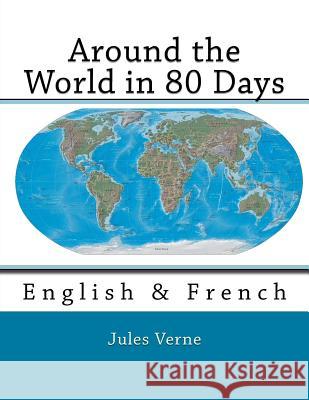Around the World in 80 Days: English & French » książka
Around the World in 80 Days: English & French
ISBN-13: 9781500744533 / Angielski / Miękka / 2014 / 160 str.
Around the World in 80 Days: English & French THIS EDITION: This is an abridged edition of Around the World in 80 Days, by Jules Verne. The story was originally written in French. The French text has been in large part translated anew into English for this dual-language project. Essentially, the story has been rewritten in contemporary English from the original French. The emphasis is on attaining a high correlation between each set of text fragments. The dual-language text has been arranged into sub-paragraphs and paragraphs, for quick and easy cross-referencing. The book can be read in parallel text format (side by side), but can also be read only in English, or only in French. Some of the more descriptive detail, as well as some complex or otherwise confusing phrases and sentences have been omitted, the purpose being to simplify the text and make it more accessible to language students. That said, the flow of the story is retained throughout, and it contains all of the diverse scenes - that Jules Verne enthusiasts will be expecting. If you are having trouble with the level of difficulty in the text, a suggested path for learning languages is as follows: Familiarise yourself with a basic language instruction book - or re-read the one you have. Once a student has studied the basics, a suitable book about basic grammar can be helpful. The suggestion is that any grammar book be studied more with the intent of recognition and understanding, rather than memorising and obsessive rote learning. Go through as much of the grammar book you feel you can digest - maybe even the whole book - skipping over what is not easily understood. After this, read through a portion of text in a book called 'French Sentences', by 2LanguageBooks, looking for examples of what you have picked up (or gleaned) in your hopefully not so arduous study of grammar. Even repeatedly seeing a word that you remember seeing listed as a 'subject pronoun' or a 'third person plural' verb of some sort is a great help. Then, depending on your inclination, return to the grammar book (or your basic French book), or move on to lengthier bilingual text - like in 2Language Books texts containing conversations, news, or stories, for example -, or find some suitable French text: a simple novel, a French news website, etc. Grammar books will likely have some verb charts. However, there are currently good on-line resources that go further - dictionaries with a verb conjugation 'search' option. Many basic language books offer some form of audio support. Internet services - primarily news based radio stations - offer podcasts. Audio from television is an additional resource, and can be formatted for use on various digital platforms. However, if audio is an important component of your interest in languages, electronic devices that support quality text-to-speech (TTS) will likely be appealing. With a library card, TTS technology (in a device that supports the relevant content), and the above mentioned resources, an entire language learning system is available for not much more than a cup of coffee There is no substantial financial outlay to get you started. Furthermore, there are no additional ongoing fees (and updates), and there are no expiry dates on 'premium' content and resources. (A Dual-Language Book Project) 2Language Books
Zawartość książki może nie spełniać oczekiwań – reklamacje nie obejmują treści, która mogła nie być redakcyjnie ani merytorycznie opracowana.











